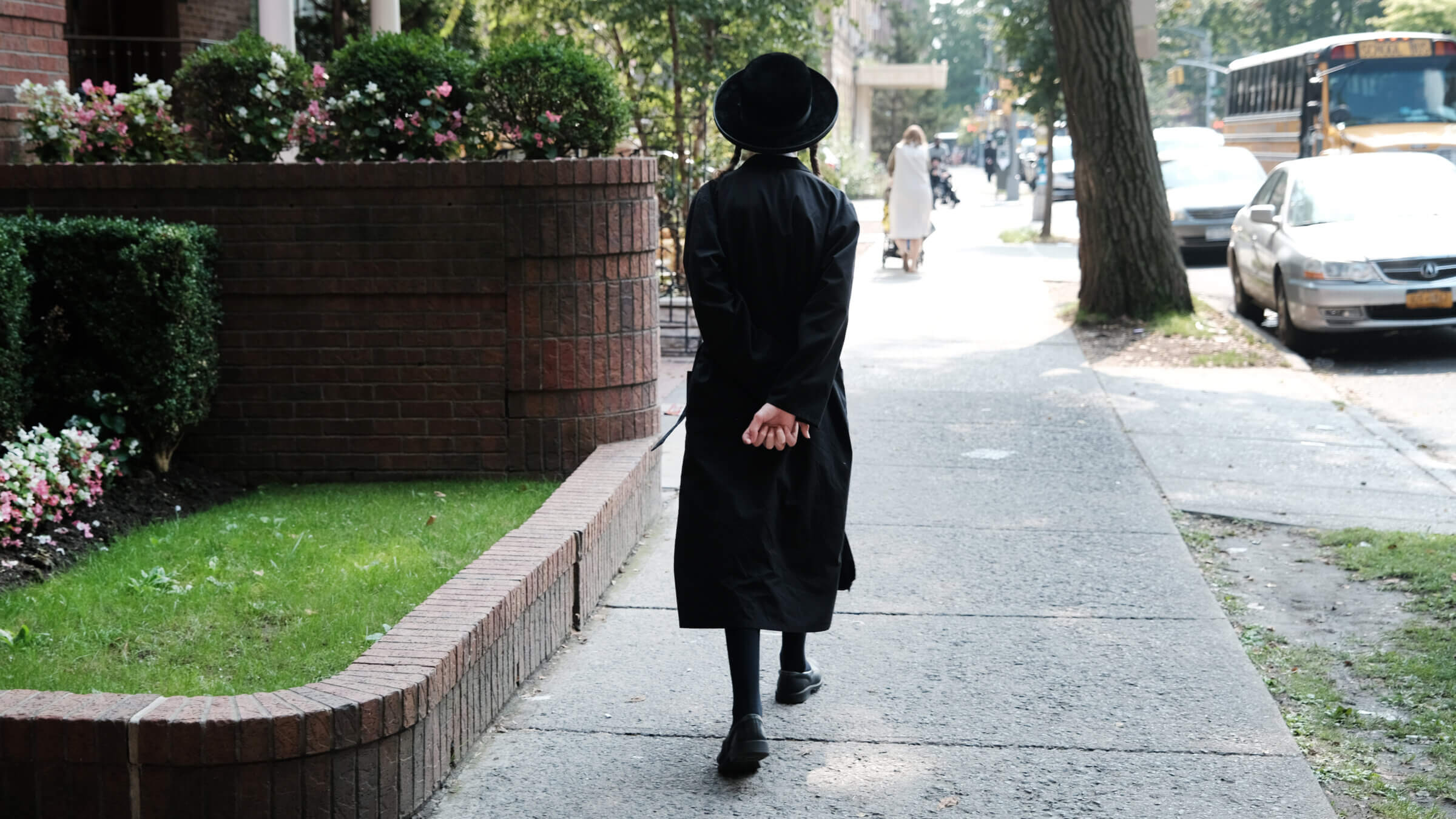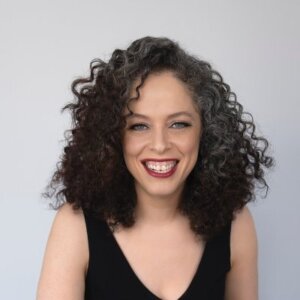I understand why some Orthodox Jews hate The New York Times’ yeshiva report. But ignoring our failures doesn’t help Hasidic boys like mine
Virtually every Hasidic child is taught that outsiders and even non-Orthodox Jews are to be feared, writes one parent of ultra-Orthodox children.

An Orthodox Jewish boy walks down a street outside of a yeshiva school in Borough Park, Brooklyn, on Sept. 12, 2022. Photo by Spencer Platt/Getty Images
The recent New York Times article on the state of Hasidic Yeshiva education, with its shocking revelations, was news to many of its readers. But for parents from the Hasidic community like myself, the information reported was nothing new.
And yet, as I read the article when it dropped early Sunday morning at 3 a.m., I felt my heart drop and fill with terror. The photos of the children could have been my children or grandchildren. The schools mentioned were the very schools my children attend and the issues discussed were issues all six of my sons have experienced.
Logically, I know that calling attention to problematic issues is the first step to influencing change. Nothing gets resolved by pretending it doesn’t exist.
And yet, this report felt so wrong, almost dangerous. And as I thought about what I was feeling, many childhood memories started coming back to me. I recalled the song that we sang at the Passover Seder about non-Jews: “In every generation, they arise to kill us, but God saves us from their hands.”
I grew up hearing the stories of my grandparents running for their lives during the Holocaust in Hungary, hiding from outsiders and doing whatever they could to survive and keep their families safe. I heard stories about their arrival in the United States and their determination to live in a Hasidic neighborhood. They believed that they could only trust their own people, and that they would be safest there. I carry the heartbreaking memories of their lives, the agony of their hope, and the generational trauma resulting from what they experienced.
These lived experiences are not unique to the family system I grew up in, but are part and parcel of growing up as a Hasidic child. There is a fundamental worldview that virtually every child is taught, that outsiders, non-Jews, and even non-Orthodox Jews are to be feared. If we aren’t vigilant and careful enough, they will harm us.
Over the last few days, Hasidic and ultra-Orthodox schools have arranged prayer vigils for students across the state and country, to preempt and prevent “The Harsh Decree” from descending on the community, using language reminiscent of the Biblical harsh decrees meted out by Pharaoh in Egypt against the Jews.
“The Harsh Decree” they are referring to is the substantial equivalency regulations that the Board of Regents unanimously voted for on Tuesday, which will provide some measure of enforcement over the education at private schools in New York state.
I understand where this fear comes from. It is the same fear that I was taught to have as a child. But like all irrational fears, the xenophobic reaction of the Hasidic world to contemporary civil society is a liability. The community and its members are not served by its ethic of living apart from mainstream society and the belief that outsiders are out to harm them.
As I thought about this fear of others and what it does to us, I started recalling other childhood memories that were rarely discussed.
My grandparents survived the Holocaust only because outsiders helped them at great risk to their own lives. One of my grandmothers, who was blue-eyed, got a job at a local hospital in Budapest and was protected by the head nurse who knew she was Jewish. My grandfather from Czechoslovakia had friends who were able to get him a visa to England. The local priest in my other grandfather’s town offered to hide him in 1944 as the Nazis arrived in Hungary and began deporting and killing the Jews.
Despite these incredible experiences, these stories were rarely spoken of in my family. Instead, the visceral fear of outsiders continued to grow larger and larger as the trauma grew more and more entrenched.
When I left my Hasidic marriage in 2014, my parents desperately warned me not to take it to a secular court. But it was only by going to the secular family court that my rights as a parent were protected and I was able to maintain custody of my four younger children. Sadly it is often the case that many women lose custody of their children when leaving a Hasidic marriage.
I am a big believer in the healing power of telling our stories, as well as the powerful impact it can have on others. I have personally written and spoken about my own experiences of leaving the Hasidic community. But the truth is that the fear of outsiders, and of “airing our dirty laundry,” has been exploited by leaders in the community to enact and enforce stricter and stricter rules — and to mete out severe punishments to those who speak up to outsiders.
The “Harsh Decree” endangering Hasidic children is not The New York Times, but the choices of the leaders. The dire situation in Hasidic schools is a direct result of leaders telling their adherents that any changes to the school system are against their values and a threat to their Jewish heritage, when in fact nothing could be further from the truth.
Education has always been a Jewish value.
One of the most tragic parts of this scandal is that outside leaders, who are in a position to help, have known — and have chosen to do nothing. For over a decade, parents and former students of Hasidic yeshivas, most notably Naftuli Moster and Yaffed, have been speaking up about this issue. They have been met with tremendous resistance from politicians, lawmakers and organizations throughout the state.
With few exceptions, most outsiders have refused to get involved. The claim was that they didn’t want to interfere. This issue was not their “business.” They needed to stay in their “lane.”
These attitudes are not only wrong, but dangerous. To ignore the plight of Hasidic children is negligence itself. Jewish tradition mandates that we intervene in situations where the well-being of others is imperiled.
I am hopeful that now that the issues are out in the open, Jewish organizations, educational advocacy groups, politicians and lawmakers will join together and help support our children and ensure that they receive the education they deserve.
And I’m hopeful that Hasidic parents who truly want the best for their children, who know in their hearts that all knowledge comes from God and is holy, will challenge the culture of xenophobia that persists in our community.
My grandparents would have never made it out of the Holocaust without the help of outsiders.
I could have never left my difficult marriage without outside support and resources.
And our children and grandchildren will receive the education they deserve when they receive the attention, resources and support of outsiders as well.
To contact the author, email [email protected].
A message from our Publisher & CEO Rachel Fishman Feddersen

I hope you appreciated this article. Before you go, I’d like to ask you to please support the Forward’s award-winning, nonprofit journalism so that we can be prepared for whatever news 2025 brings.
At a time when other newsrooms are closing or cutting back, the Forward has removed its paywall and invested additional resources to report on the ground from Israel and around the U.S. on the impact of the war, rising antisemitism and polarized discourse.
Readers like you make it all possible. Support our work by becoming a Forward Member and connect with our journalism and your community.
— Rachel Fishman Feddersen, Publisher and CEO






























